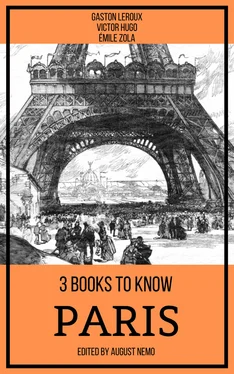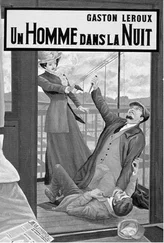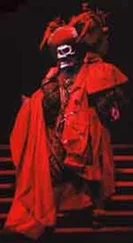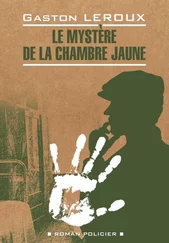Jehan, master of the field of battle, pursued triumphantly:
“That’s what I’ll do, even if I am the brother of an archdeacon!”
“Fine gentry are our people of the university, not to have caused our privileges to be respected on such a day as this! However, there is a maypole and a bonfire in the town; a mystery, Pope of the Fools, and Flemish ambassadors in the city; and, at the university, nothing!”
“Nevertheless, the Place Maubert is sufficiently large!” interposed one of the clerks established on the window-sill.
“Down with the rector, the electors, and the procurators!” cried Joannes.
“We must have a bonfire this evening in the Champ-Gaillard,” went on the other, “made of Master Andry’s books.”
“And the desks of the scribes!” added his neighbor.
“And the beadles’ wands!”
“And the spittoons of the deans!”
“And the cupboards of the procurators!”
“And the hutches of the electors!”
“And the stools of the rector!”
“Down with them!” put in little Jehan, as counterpoint; “down with Master Andry, the beadles and the scribes; the theologians, the doctors and the decretists; the procurators, the electors and the rector!”
“The end of the world has come!,’ muttered Master Andry, stopping up his ears.
“By the way, there’s the rector! see, he is passing through the Place,” cried one of those in the window.
Each rivalled his neighbor in his haste to turn towards the Place.
“Is it really our venerable rector, Master Thibaut?” demanded Jehan Frollo du Moulin, who, as he was clinging to one of the inner pillars, could not see what was going on outside.
“Yes, yes,” replied all the others, “it is really he, Master Thibaut, the rector.”
It was, in fact, the rector and all the dignitaries of the university, who were marching in procession in front of the embassy, and at that moment traversing the Place. The students crowded into the window, saluted them as they passed with sarcasms and ironical applause. The rector, who was walking at the head of his company, had to support the first broadside; it was severe.
“Good day, monsieur le recteur! Holà hé! good day there!”
“How does he manage to be here, the old gambler? Has he abandoned his dice?”
“How he trots along on his mule! her ears are not so long as his!”
“Holà hé! good day, monsieur le recteur Thibaut! Tybalde aleator! Old fool! old gambler!”
“God preserve you! Did you throw double six often last night?”
“Oh! what a decrepit face, livid and haggard and drawn with the love of gambling and of dice!”
“Where are you bound for in that fashion, Thibaut, Tybalde ad dados, with your back turned to the university, and trotting towards the town?”
“He is on his way, no doubt, to seek a lodging in the Rue Thibautodé?” * cried Jehan du M. Moulin.
* Thibaut au des,—Thibaut of the dice.
The entire band repeated this quip in a voice of thunder, clapping their hands furiously.
“You are going to seek a lodging in the Rue Thibautodé, are you not, monsieur le recteur, gamester on the side of the devil?”
Then came the turns of the other dignitaries.
“Down with the beadles! down with the mace-bearers!”
“Tell me, Robin Pouissepain, who is that yonder?”
“He is Gilbert de Suilly, Gilbertus de Soliaco, the chancellor of the College of Autun.”
“Hold on, here’s my shoe; you are better placed than I, fling it in his face.”
“Saturnalitias mittimus ecce nuces.”
“Down with the six theologians, with their white surplices!”
“Are those the theologians? I thought they were the white geese given by Sainte-Geneviève to the city, for the fief of Roogny.”
“Down with the doctors!”
“Down with the cardinal disputations, and quibblers!”
“My cap to you, Chancellor of Sainte-Geneviève! You have done me a wrong. ‘Tis true; he gave my place in the nation of Normandy to little Ascanio Falzapada, who comes from the province of Bourges, since he is an Italian.”
“That is an injustice,” said all the scholars. “Down with the Chancellor of Sainte-Geneviève!”
“Ho hé! Master Joachim de Ladehors! Ho hé! Louis Dahuille! Ho he Lambert Hoctement!”
“May the devil stifle the procurator of the German nation!”
“And the chaplains of the Sainte-Chapelle, with their gray amices; cum tunices grisis!”
“Seu de pellibus grisis fourratis!”
“Holà hé! Masters of Arts! All the beautiful black copes! all the fine red copes!”
“They make a fine tail for the rector.”
“One would say that he was a Doge of Venice on his way to his bridal with the sea.”
“Say, Jehan! here are the canons of Sainte-Geneviève!”
“To the deuce with the whole set of canons!”
“Abbé Claude Choart! Doctor Claude Choart! Are you in search of Marie la Giffarde?”
“She is in the Rue de Glatigny.”
“She is making the bed of the king of the debauchees. She is paying her four deniers* quatuor denarios.”
* An old French coin, equal to the two hundred and
fortieth part of a pound.
“Aut unum bombum.”
“Would you like to have her pay you in the face?”
“Comrades! Master Simon Sanguin, the Elector of Picardy, with his wife on the crupper!”
“Post equitem seclet atra eura—behind the horseman sits black care.”
“Courage, Master Simon!”
“Good day, Mister Elector!”
“Good night, Madame Electress!”
“How happy they are to see all that!” sighed Joannes de Molendino, still perched in the foliage of his capital.
Meanwhile, the sworn bookseller of the university, Master Andry Musnier, was inclining his ear to the furrier of the king’s robes, Master Gilles Lecornu.
“I tell you, sir, that the end of the world has come. No one has ever beheld such outbreaks among the students! It is the accursed inventions of this century that are ruining everything,—artilleries, bombards, and, above all, printing, that other German pest. No more manuscripts, no more books! printing will kill bookselling. It is the end of the world that is drawing nigh.”
“I see that plainly, from the progress of velvet stuffs,” said the fur-merchant.
At this moment, midday sounded.
“Ha!” exclaimed the entire crowd, in one voice.
The scholars held their peace. Then a great hurly-burly ensued; a vast movement of feet, hands, and heads; a general outbreak of coughs and handkerchiefs; each one arranged himself, assumed his post, raised himself up, and grouped himself. Then came a great silence; all necks remained outstretched, all mouths remained open, all glances were directed towards the marble table. Nothing made its appearance there. The bailiff’s four sergeants were still there, stiff, motionless, as painted statues. All eyes turned to the estrade reserved for the Flemish envoys. The door remained closed, the platform empty. This crowd had been waiting since daybreak for three things: noonday, the embassy from Flanders, the mystery play. Noonday alone had arrived on time.
On this occasion, it was too much.
They waited one, two, three, five minutes, a quarter of an hour; nothing came. The dais remained empty, the theatre dumb. In the meantime, wrath had succeeded to impatience. Irritated words circulated in a low tone, still, it is true. “The mystery! the mystery!” they murmured, in hollow voices. Heads began to ferment. A tempest, which was only rumbling in the distance as yet, was floating on the surface of this crowd. It was Jehan du Moulin who struck the first spark from it.
“The mystery, and to the devil with the Flemings!” he exclaimed at the full force of his lungs, twining like a serpent around his pillar.
Читать дальше









